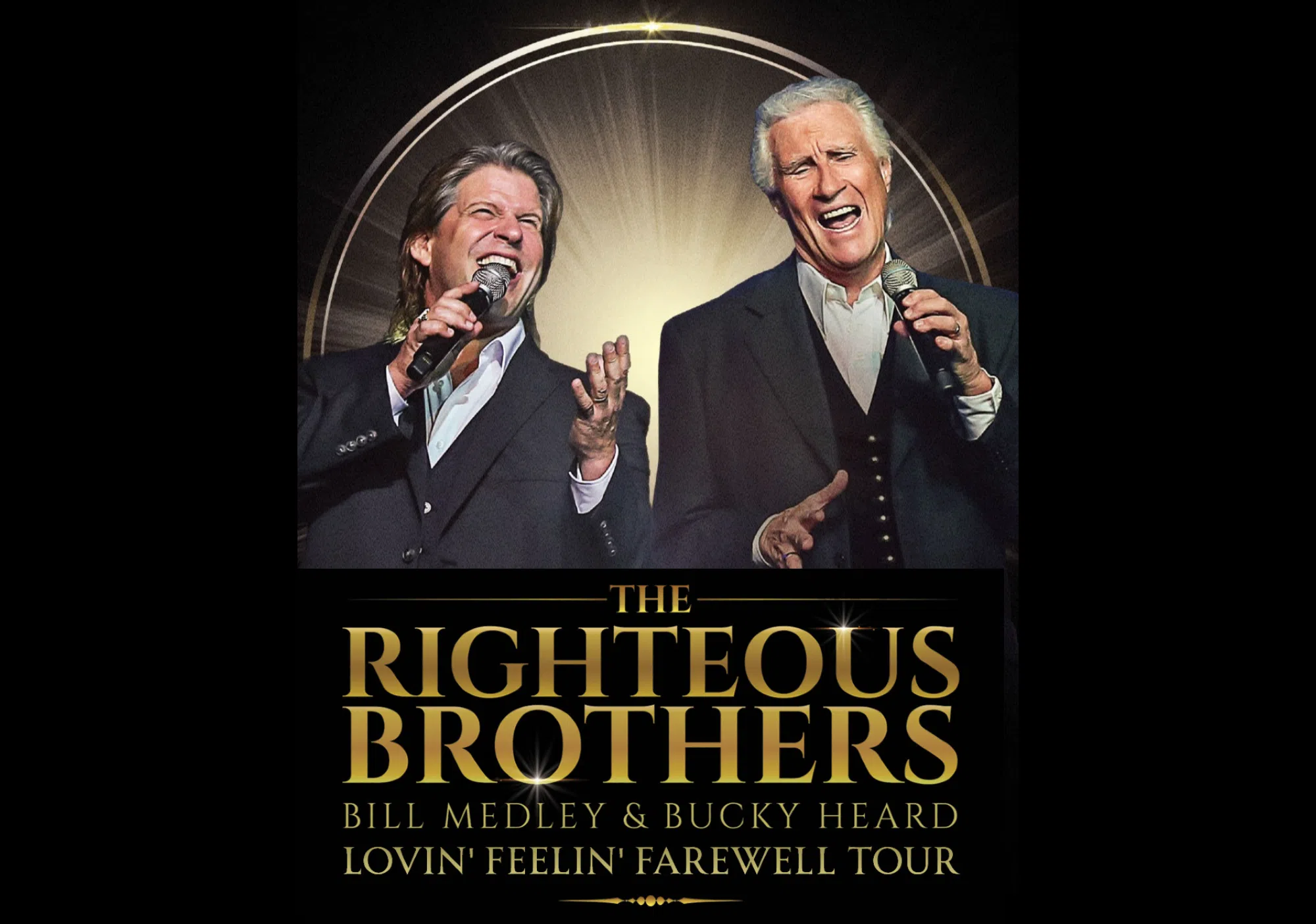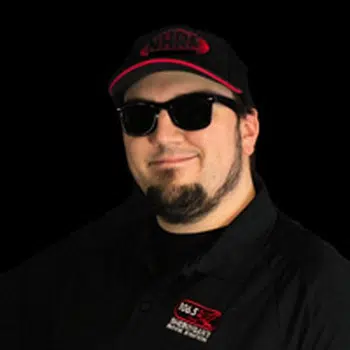Legendary performers “The Righteous Brothers” will appear at Sheboygan’s Weill Center on Thursday night as part of the group’s “Lovin’ Feelin’ Farewell Tour”. Bill Medley, the founding member of the duo, along with Bobby Heard, whom Medley took on after some years following the passing of partner Bobby Hatfield in 2003, told WHBL news in an interview that it’s not “goodbye” to performing, but to the traveling, that puts the “farewell” in the tour that’s now crisscrossing the country.
The interview with Medley covered a wide range of subjects, from the early days of the group to the current show, and was a sort of “deep dive” into the making of a legendary act.
WHBL: The 60s and 70s era of music was ground-breaking for popular music in many ways. What was that scene like for you?
Medley: It was truly a magical time, and, ‘cause most of us guys from the 60s learned from the guys in the 50s, and real rock n roll was being done by the black artists like Little Richard & Fats Domino, Chuck Berry & guys like that, so going into the studio in the 60s, you know, we were trying to create that sound, and even make it punchier, and so there was a lot of creating going on in the early, early 60s, at least for us. And the other guys, you know, you go in the studio, and I can remember going in the studio, and Brian Wilson of the Beach Boys would be in the other studio next door, and he would come in and get me, and say “I’m having a problem with this, or that, and do you have any ideas where I would bring him in,” so it was just magical. And sometimes you did exactly what occurred in your brain, but sometimes not.
WHBL: So you were working with the wrecking crew at that time? (The “Wrecking Crew” was a set of studio musicians and producers in LA that revolutionized the entire way that recorded music was made.)
Medley: Oh, sure…well, we didn’t start out with the wrecking crew until about ‘64. And Bobby and I had some hits earlier…
WHBL: I think “Lupe Lu?”
Yeah, “Little Latin Lupe Lu” was the first one, and “My Baby”, and we had three or four Midwest hits, and that’s really when we were trying to figure everything out and invent something. But when we started working with Phil Spector and the wrecking crew, and they were such great musicians, and Phil Spector was a brilliant, brilliant producer. And I produced, well, actually I produced the albums when we were with Phil. Phil just wanted to do the singles, because he would take too long, and spend too much money. So I produced the albums, because I had produced Little Latin Lupe Lu and all the early stuff I produced. But it was so great just to be able to walk in and sing Lovin’ Feelin’ to those tracks.
WHBL: And just getting the keys to the studio in the first place was the real challenge back then, because there weren’t a lot of them around, and those that were, and were worth their salt, the cost a lot and they were in big demand.
Medley: Yeah, Gold Stars is where we did most of our recording, and everybody…but everybody…wanted to record there. They had great engineers, and they had a great reverb system, it was just a great place.
WHBL: So you were able to absorb all these great professionals around you and become a better producer. I had no idea that you were doing the producing on that.
Medley: I accidentally produced Unchained Melody, ‘cause it was just supposed to be an album cut. But Phil put it on the “B” side (laugh) of Hung on You, which was supposed to be the hit, but for some reason all the disc jockeys turned it over and started playing Unchained Melody, and then when we left Phil, I produced Soul and Inspiration.
WHBL: And so when did Lovin’ Feelin’ line up with all of these? (Chronologically)
Medley: Like I said, we were having these hits with Lupe Lu, My Babe and Koko Joe and all that stuff, and Phil Spector knew about us, and we did a show with the Ronettes and he was there, and he wanted to produce us, and so that was in ‘64. And we were also on a TV show “Shindig” – and we were regulars on that – and so, it was like the perfect storm. We had recorded Lovin’ Feelin’ and was doing Shindig every week, and we were becoming nationally-known because of the TV show. And we released Lovin’ Feelin’ and it just took off.
WHBL: And talk about taking off, I understand that is THE most played song of the 20th Century, is that correct?
Medley: (Laugh) Yeah, that’s pretty amazing. That’s so hard to wrap your brain around…THE MOST out of all the greats around, the great songs over the years. I mean, we’re in the Rock ‘n’ Roll Hall of Fame, but so are about 300 other people. So it’s very wonderful to be in the Hall of Fame. But again, to have the most played record, I can’t screw my head onto it.
WHBL: That’s brand new territory.
Medley: Yeah.
WHBL: There are very few people who can say they started performing back when you did, and are still doing it. You know, you’ve got the chops, you’ve got the stamina, but now it’s getting to where you’re saying “it’s a good time to put a cap on this.”?
Medley: Well, I’m certainly not putting a cap on performing. I just love, love, love to perform. It’s the traveling. It’s the traveling, and by the way I’ve talked to five or six other artists, literally within the last couple of months, who said “yeah, this is our last year”, because it’s the traveling. The traveling is just tough. The airports are getting tougher. You know, the shows we do for nothing. You pay us to travel.
WHBL: It had to be really tough to find a replacement once Bobby Hatfield passed away, but now you’ve got Bucky Heard, and I understand you really love the results of that.
Medley: I really love the results, and I love Bucky – he’s a great partner. And, you know, Bobby passed away in ‘03, and from 2003 to 2013 I wasn’t looking to re-form the Righteous Brothers, but I had so many people, fans and friends and people that work for me that said “Boy, you’ve got to keep that music alive!” And I just wasn’t looking to do it, but I was working in Branson, Missouri and so was Bucky, and we became friends, and I went in to see him do a new show that he had put together and he was doing a couple of Journey songs, and he just killed it. And I said “My God, if you can do Journey maybe you can do Bobby Hatfield.”
WHBL: Bobby was hitting some high notes in there.
Medley: Oh, boy, Bobby could sing up there. He was a great singer, but so was Steve Perry. So I really wasn’t looking to do it, but I was taking a walk one day after I had seen him (Heard), and I said “You know, man, I guess if I was going to do it I should at least sit down with Bucky around a piano and see if we can come up with a blend and make it work.” And boy, it just worked…it just worked magically. You know, it was kind of like Bobby and I – we just fit together.
WHBL: You’ve seen your share of venues, so what’s your favorite sort to perform in?
Medley: Oh, boy that’s hard to call. You know, we’ve done so many shows in so many wonderful, wonderful…you know the Fox Theaters were always amazing to me. There’s one in Detroit that, you just look at them and say “When did they build this”, and “WHY did they build this?” But I don’t know. The Righteous Brothers have been very blessed with just the greatest audiences in the world, and so I really kind of remember loving, like, performing in Chicago, or performing in San Francisco, and Vegas is always fun because they’re coming to see you. But the theaters, I don’t know…I’m just blessed that there were enough theaters to go out there and work and “get the monkey off my back”.
WHBL: That guy’s not leaving anytime soon.
Medley: (Laugh) Yeah. Probably.
WHBL: Now I understand you’d like to mentor some younger people, and you know the future of music has been a little bit in question over the last couple of years. How do you feel about that?
Medley: Well, I hate to sound like an old man, which I am, but I think it’s getting better. About 10 years ago I felt that, we’re just losing, we’re really losing the soul of music, you know, and I’m not putting down rap music, I think it’s very legitimate what they do, and I couldn’t do it, but…
WHBL: But I think back to…nobody will every make another Frank Sinatra singing “One More for my Baby and One More for the Road”, and he just makes love to that song. And they don’t make the songs to make love to anymore.
Medley: I know, I’ve always said my entire career, Frank Sinatra, in all his songs, first he lived it, then he wrote about it, and then he sang it. But the truth is, he had great writers. But of course, I think he lived out a lot of those songs.
WHBL: I know you’re going to have a great collection of songs to present next week.
Medley: Yeah, we’re going to be doing all the hits; we know why they’re there, and we still love doing them, and it’s just such a turn-on to be able to turn the audience on, and they turn us on, and we turn them on, and it just becomes a wonderful evening.







Comments